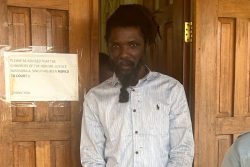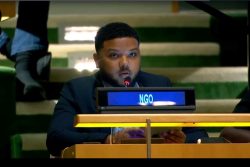– Ramsammy
Minister of Health, Dr Leslie Ramsammy said Men who have Sex with Men (MSM) remains one of the more stigmatized groups in the country, which he said poses a problem in the fight against HIV.
The sector is dealing with stigma and discrimination on a continual basis and the issues surrounding homosexual sex, the minister said in a recent interview, and though he is of the opinion that homosexual sex is not criminal, he believes decriminalizing it would be an imposition on society which is not ready “for such a step”.
Ramsammy said it is inevitable that someday Guyana will move to decriminalize homosexual sex, but he opined the country must be ready for such a step. Further, he expressed doubt that any of the countries in the Caribbean is ready. He said this must not be imposed on a country, noting that whether he sees it as a problem or not means very little. “Criminalizing it is wrong, but that doesn’t mean we should legalize it either,” he added.
He said that if the vast majority of the population feels a certain way then things should not be imposed on them, “I believe it is not a criminal act. I also believe that it would be a mistake for us to impose it on the nation,” he said. Ramsammy said also that people need to be persuaded, saying that Guyana is a very conservative country where such matters are concerned. He said a vast majority of the Guyanese public would oppose decriminalizing homosexual sex. Ramsammy expressed disappointment that people are still afraid to talk about it stating, “This is another mistake because it is something we should talk about”.
On the issue of patients being stigmatized at the hospital, Ramsammy stressed that the sector does not discriminate. He said HIV patients are not in a particular section of the public hospital, and insisted that the health sector has never really grouped patients together. He said that “people just assumed”. He continued that patients are not in a position where they are up for discussion at any hospital. “There is no way you can walk into the hospital and say that any particular person is infected with the disease,” he added. He said there is now an infectious disease wards for persons recovering from illnesses such as leptospirosis and dengue and also AIDS-related illnesses.
Prior to 2000, he said, many health care workers did not want to see patients with HIV and nobody wanted to work at the then Genito-Urinary Medicine (GUM) clinic. This has changed, Ramsammy declared, adding that “health workers see it as a prestigious thing to work with HIV patients today”. He said there has been a shift in attitudes in the society, adding that the general public is less afraid to confront their own fears about it. However, he admitted that many people are still traumatized when it affects a family member.
“People don’t look as sick as they used to,” he said and opined that fear made families abandon HIV infected people in the past — around 60 percent were left on their own prior to 2000. Ramsammy said families are now keeping their relatives at home. “There are still high levels of stigma, not only for those living with it but people who are believed to be living with it,” he added and referred to Commercial Sex Workers and MSM as still being highly stigmatized.
Drug resistance
Drug resistance is also a problem though there are a few cases, Ramsammy said, noting that what poses the problem is when people transmit the virus that is resisting the drugs. He said people who are infected in this manner have problems with the treatment because they get infected with a virus that is already resistant and “that’s a problem”. He said that any person who is infected and with a resistant virus would inherit the resistance and this results in cases where people do not respond to a particular medication.
Further, he said patients who lack a support system also pose serious problems in terms of drug resistance because “adherence to treatment hinges on a support system”. Ramsammy said those who do not adhere to the treatment end up resisting the drugs. “The virus gets an opportunity to learn how to deal with the drugs when you relax, it’s a war and if you relent a little bit the virus gets a chance to strike and puts up a resistance,” he added.
He said testing is now more widely accessible, noting that in the past there were fewer sites, and currently all the regions have approved sites. Ramsammy feels more people are getting tested, but he acknowledged that not everyone who is tested every year is a new person. Still, he said, the repeat tests are important. He said what matters is that of the 350,000 tests they have done within the last three years around 100,000 persons of the 400,000-plus sexually active population in Guyana know their status. “This doesn’t mean we should relax, every citizen should know their status, I don’t think anyone of us should feel happy that there are people among us who have not been tested and have no clue what their status is,” he observed.
According to Ramsammy, what has changed with respect to testing is that many people are no longer getting tested in secrecy. He said people easily line up, as evident last week during the National Week of Testing. “Many people don’t care if people see them these days and this has made the process easier,” Ramsammy noted. He said this is a major achievement for the programme.
Cost
Asked what HIV is costing the health sector every year Ramsammy said “a great deal”. He pointed out that the antiretroviral regimen (ARV) costs about US$1,000 ($200,000) per patient and this is solely for medications alone. Given the number of patients on the drugs that is US$3 million. He noted that AIDS patients also need antibiotics, skin creams and vitamins among other things which incur additional costs, adding that “the mere supplies averages around $1 billion a year”. He said each AIDS patient also requires two CD4 tests a year and one test costs US$50.
When laboratory tests, which include liver function, cholesterol level among other things are added in that works out to another $100 million, according to Ramsammy. In terms of the management of persons on ARVs, he said, supplies alone cost $1 billion, which excludes the salaries of the health officials. There is also a cost attached for similar testing and laboratory checks for 6,000 patients who are being managed for HIV. The awareness programmes and the other support work being funded for HIV brings the cost to around $5 billion annually, he added. The administration puts up a portion of the money while donors such as the Global Fund, World Bank and PEPFAR heavily subsidize the local budget.
Ramsammy said Guyana has not had a shortage of ARVs for the last five years at least, and he revealed that the first-line drugs are being purchased from Gilead in the US. He said that because the health sector uses PEPFAR and Global Fund resources the drugs are procured through a tender process.








